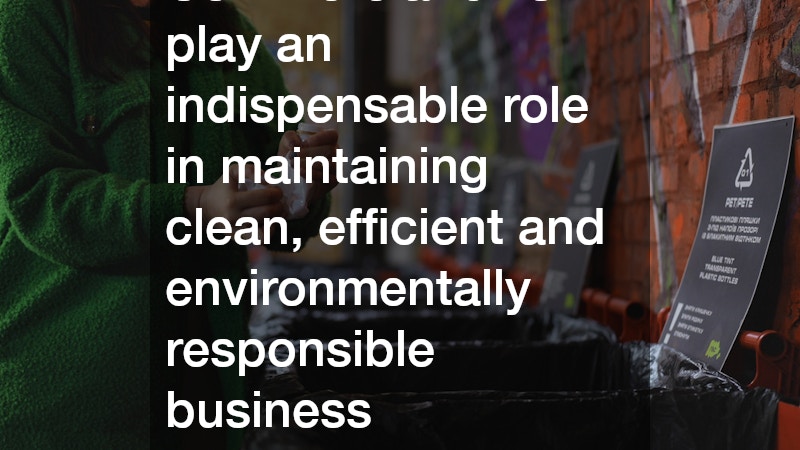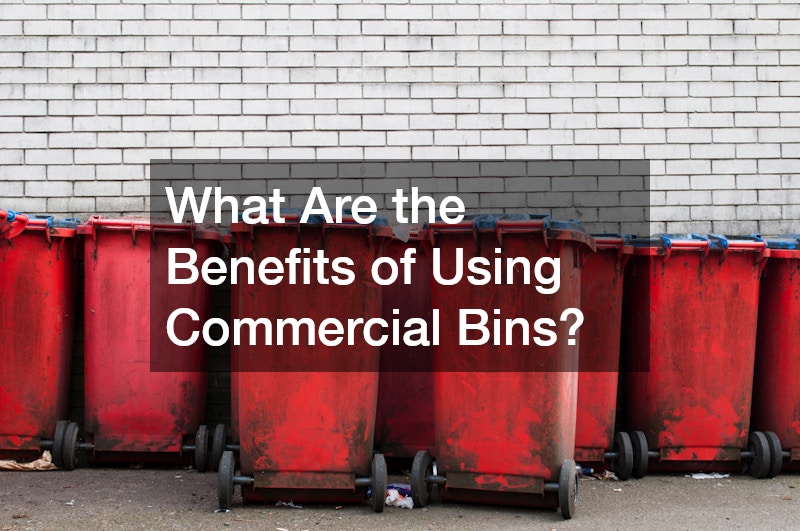Managing waste efficiently is a core responsibility for any commercial business, whether it’s a small café, a retail outlet or a large-scale manufacturing facility. Proper waste disposal not only ensures cleanliness but also supports public health, environmental responsibility and operational efficiency. One of the most effective ways to achieve this is by using commercial bins tailored to business needs. These purpose-built waste solutions offer a range of advantages, making them essential for modern business operations.
Enhancing Workplace Hygiene & Safety
The cleanliness of a business premises plays a vital role in shaping perceptions, maintaining staff health and meeting occupational safety standards. By providing designated waste disposal points, commercial bins help reduce the build-up of rubbish in work areas, eliminating clutter that could pose safety hazards such as slips, trips and pest infestations. Whether used indoors for food scraps in a commercial kitchen or outdoors for general waste at an office complex, these bins offer a hygienic way to manage all types of waste.
High-quality commercial bins are typically designed to be durable, sealed and resistant to weather, leaks and odours. This helps prevent contamination and the spread of bacteria, particularly in sectors such as hospitality or healthcare where hygiene standards are tightly regulated. Bins that are regularly emptied and maintained support a clean and safe working environment, ensuring compliance with local health codes and reinforcing a business’s commitment to best practices.
Supporting Sustainability Goals
Today’s consumers are increasingly conscious of environmental impact and businesses are under pressure to adopt greener practices. One of the simplest yet most impactful steps a business can take is improving how it sorts and disposes of waste. Commercial bins can be used to segregate general waste, recyclables, organic materials and hazardous substances, enabling efficient sorting and minimising landfill contributions.
Many waste service providers offer bins in colour-coded systems, making it easy for employees and customers to distinguish between waste types. When staff are educated on proper waste sorting and provided with accessible disposal points, participation in recycling initiatives increases. This not only helps businesses meet sustainability targets but can also reduce waste disposal costs through improved recycling rates. Over time, using commercial bins as part of a broader waste management strategy can lead to both financial and environmental benefits.
Increasing Operational Efficiency
Time and labour are valuable resources in any business. Poor waste management often leads to unnecessary manual handling, cluttered workspaces and inefficient workflows. Commercial bins, especially those designed for high-volume or specialised waste, allow teams to dispose of materials quickly and correctly, keeping operations moving smoothly. For example, wheeled bins make it easier to transport waste from work areas to disposal zones without additional equipment.
Customised bin solutions—such as compactors, skip bins or balers—can be integrated into daily routines to streamline the handling of bulky or high-volume waste. This reduces the frequency of waste collections, minimises interruptions and optimises space usage on-site. By matching the type and size of commercial bins to specific operational needs, businesses can reduce labour time, enhance productivity and lower long-term waste management costs.
Presenting a Professional Image
First impressions matter. A business’s approach to waste disposal speaks volumes about its attention to detail and sense of responsibility. Overflowing bins or improperly disposed rubbish can deter customers, tarnish reputations and attract unwanted attention from local councils. In contrast, a neat and structured waste management system sends a message of professionalism, cleanliness and care.
For customer-facing industries such as retail, hospitality or healthcare, using purpose-designed commercial bins helps keep premises tidy and presentable. Bins placed discreetly and emptied regularly support a polished image while encouraging patrons to dispose of their waste properly. With waste under control, staff can focus on providing better service rather than being distracted by avoidable clean-up tasks.
Meeting Legal & Environmental Compliance
Australian businesses must comply with state and territory regulations regarding waste handling and environmental management. Failure to meet these obligations can result in significant penalties, particularly in sectors handling hazardous or regulated waste materials. Commercial bins are instrumental in ensuring legal compliance by offering secure, labelled and fit-for-purpose containers that meet statutory standards.
Many bin providers offer guidance on what type of bin is required for different waste streams, from general refuse to electronic waste and medical materials. Using compliant commercial bins reduces the risk of improper disposal, which can lead to environmental harm or legal repercussions. It also provides a clear audit trail, supporting transparent reporting for sustainability programs and corporate social responsibility goals.
Why Commercial Bins Are a Smart Investment for Every Business
Commercial bins play an indispensable role in maintaining clean, efficient and environmentally responsible business environments. From enhancing hygiene and safety to supporting compliance and sustainability efforts, the benefits of investing in the right waste disposal systems are both immediate and long-term. As businesses continue to evolve in a world increasingly focused on health, safety and environmental performance, using well-managed commercial bins is not just a necessity—it’s a strategic advantage.
.




